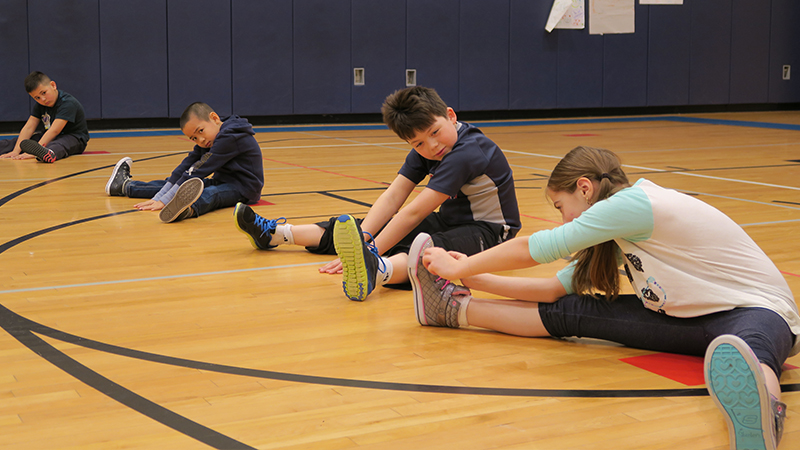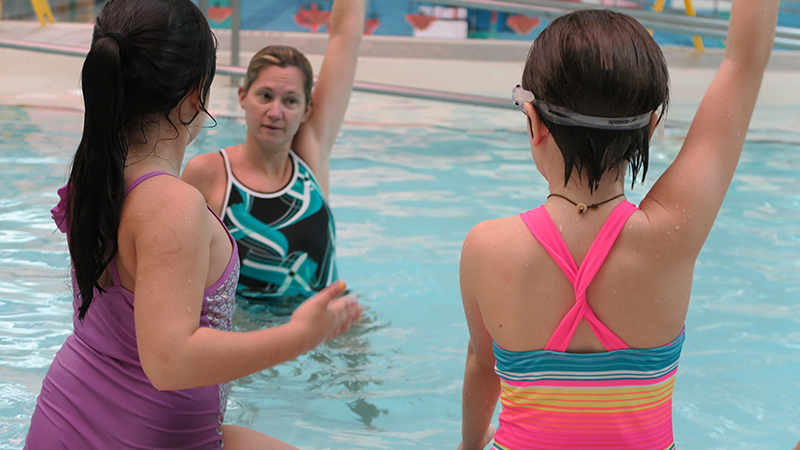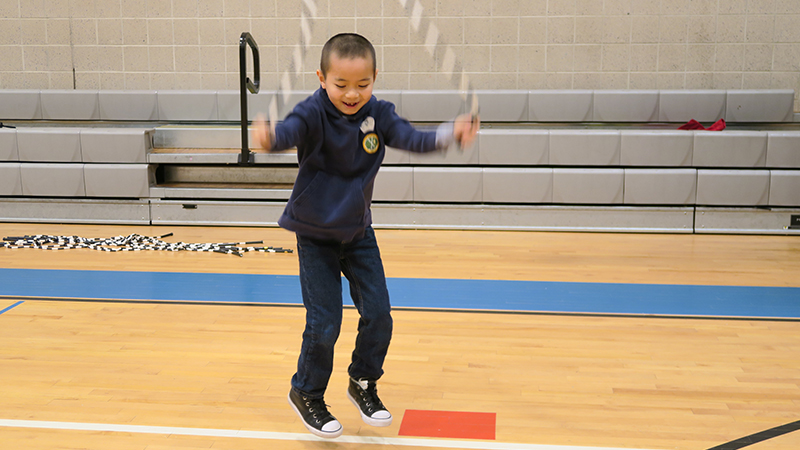Getting Kids Healthy and Active
A Lifetime of Healthy Choices
“Research backs the idea that physical fitness and wellness are strong indicators of academic and life success” says Steve Simolaris, Supervisor of the Health and Physical Education Department. With an emphasis on wellness, members of Steve’s department all have one key goal in mind: Teach students the skills they need to make a lifetime of healthy and safe choices. It all starts at the K-8 grade levels.
Socio-emotional and health classroom curriculum expand wellness beyond P.E. class. Classroom teachers help students develop foundational skills for becoming successful students, supportive peers and good friends with a program called Second Step. The John F. Kennedy School is even piloting an innovative mindfulness program. In Health, students learn to make safe decisions, assess risk and learn to advocate for themselves. The emphasis is on practical knowledge the students can use in real-world situations, such as finding resources like local health clinics and practice resisting peer pressure in scenario-based exercises. Students with these types of skills are less likely to make the types of risky decisions that can lead to unhealthy behaviors, such as substance abuse.
On the physical fitness side, the Health and Physical Education Department offers a wide variety of opportunities for students to learn skills that will lead to a lifetime of physical activity. Programming ranges from traditional skills, like skills for playing team sports, to pedestrian safety, bicycle safety and bike skills, swimming and water safety.
No One Sits Out in Gym Class
Kristine Savage, a 24-year veteran of Somerville Public Schools, teaches P.E. at the Albert F. Argenziano K-8 School at Lincoln park. If you ask Ms. Savage what she thinks might surprise parents, she will tell you “no one sits out anymore.” There was a time when physical education involved a lot of elimination games but that has shifted to “small-sided games.” More students participate for longer periods of time. Instead of a single game of basketball in class, Ms. Savage will set up several separate games at each basket that include all the students. SPS Physical Education teachers aim to have their students moderately to vigorously active 70-85% of their classroom time.

A Culture of Healthy Lifestyles
In 2015, Somerville was awarded a federal grant called the Carol M. White Physical Education Program Grant (PEP Grant). PEP Grant Project Director, Caitlin Kelly, says the function of the grant is to “create a culture of healthy lifestyles.” The PEP grant provides professional development, and increased physical education and nutrition education in Somerville before, during and after school. The PEP Grant also provides a uniform Physical Education curriculum that has been implemented across the district.
Ms. Savage credits professional development with helping her create new strategies for keeping all students involved in class, even as they transition from highly active early elementary students to more reserved middle graders. She now differentiates based on skill level and keeps more of her students playing and moving around.
Ms. Savage also reinforces “physical literacy.” Physical literacy teaches students how to take physical activity and develop new skills, regardless of skill or talent level. Students break activities into component skills they can master. This teaching philosophy supports the student’s ability to be active in a sport they love at any age, achieve a lifetime of physical fitness and give students the confidence to try new things.
Step out of your Comfort Zone
Every third grader in Somerville participates in nine weeks of swimming class at the Kennedy Pool. For many students, this is their first time in a body of water larger than a bath tub. Kennedy Pool Director, Rich Cheney and his team of instructors, call these students “walkers.” As they progress through the program and build confidence, most of the students spend the last classes playing around in water over their heads. Instructors use noodles and gentle encouragement as students try different movements in the water. The program is punctuated by a last class where students learn boating safety in actual kayaks brought into the pool. Director Cheney wants all his students “to leave swim classes with a strong understanding of how to be safe around bodies of water and confident in themselves.” He also points out “swim class is just fun.”

It’s all about the Students
Ms. Savage sees physical activity as a unifying language. "Kids come from other countries with no [common] language and suddenly are running around the gym having a blast playing freeze tag. It makes them feel better physically and socially,” she says. Her favorite day of the year is the annual tag football game between her 7th and 8th graders, dubbed Turkey Bowl. Ms. Savage loves to have students who may not fully understand the game but still feel confident they are helping their team along. She aims to “teach kids how to share, take turns, win graciously and lose graciously.”

